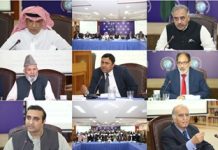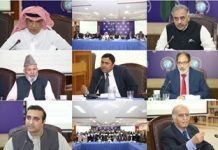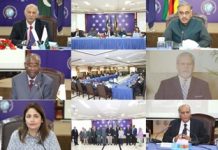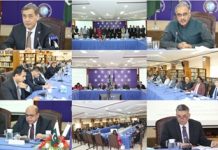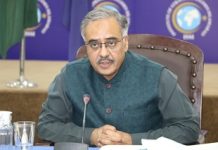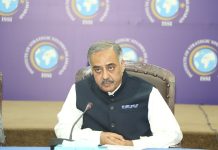Remarks by DG ISSI Ambassador Sohail Mahmood, at Seminar on “Understanding Fundamentals of India’s Contemporary Strategic Culture”,ISSI
27 March 2025
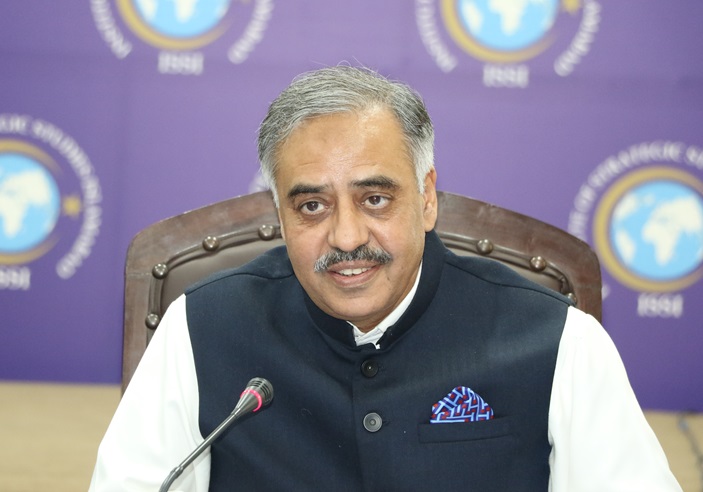
It is a distinct pleasure to welcome everyone to this seminar on the Fundamentals of India’s Contemporary Strategic Culture. This is a subject of high importance and increasingly of global attention.
We are privileged to have a panel of renowned scholars and experts to share their thoughts on how India’s strategic culture has been evolving from the ancient to contemporary times and how does it impact Pakistan. First and foremost, we are grateful to Dr. Naeem Salik, Executive Director of the Strategic Vision Institute (SVI), for being our Keynote Speaker. Dr. Naeem Salik is both a practitioner and a scholar of strategic affairs of long-standing. He is a highly respected figure in the research and academic community and we would enormously benefit from his understanding and insights.
I also extend our sincere thanks to Air Marshal Farooq Habib formerly of CASS, Dr. Asma Shakir Khawaja from CISS-AJK, and Ms. Anum Khan from CISS, Islamabad. Their expertise in our subject of today is well-established and we look forward to their valuable contributions.
Distinguished participants,
Broadly defined, as we all know, strategic culture refers to the shared beliefs, norms, values, and historical experiences of a nation’s strategic community that influence their understanding and interpretation of security issues, shaping their responses and policy decisions. At a fundamental level, it acts as a lens through which policymakers view the external security environment and make policy decisions. Experts agree that, among other things, a nation’s strategic culture is shaped by its history, geography, values, beliefs, and political structure.
With that serving as the context, I wish to make two essential points:
First, it is important for the academic, research and policy communities in Pakistan to enhance their overall analytical focus on India – both as a state and society. Given the complex dynamics of the relationship between the two countries since 1947, and the formidable challenge that India continues to pose for Pakistan across multiple domains, a continuous and deep analytical focus on India is an absolute necessity. How India sees itself and its role and place in the region and the world, what are the fundamental precepts and guiding lights for members of the Indian strategic community, what are the key drivers of India’s domestic policies and its international behaviour – all these and similar questions require sustained, systematic and rigorous research in Pakistan to develop a deeper understanding of India – for what some refer to as Bharat fehmi.
Indeed, there is an imperative need to produce a critical mass of knowledge in Pakistan about India’s demography, economy, politics, social transformation, internal security, defence, foreign relations and so on. There is also a need to have a deeper understanding of the structural issues in India – including the evolving nature of key state institutions, the class and caste systems, the Centre-States relations, the North- South equation, and the many social and cultural fault-lines. Equally, there is a need to have fuller comprehension of the overarching frameworks – from the ideological foundations to the economic development model to the national or grand strategy. Cumulatively, such a body of knowledge would help construct a well-founded view of India and serve as vital input for informed policy-making. It would also help in developing a compelling counter-narrative to India’s relentless misrepresentations of Pakistan to the outside world. Like what other nations do while tackling such adversarial relationships, Pakistan too would need to engage formidable brain power in this endeavour and make it well-resourced. There is no short-cut here. Through the India Study Center at the ISSI, we are making our modest effort to accentuate the analytical focus on India and remain open to partnering with other think-tanks and academic institutions in further reinforcing this national undertaking.
Second, there has historically been a dearth of insightful literature on India’s strategic culture, but now the landscape is changing. A significant contribution from outside India was made by the Rand Corporation Study in 1992 on Indian Strategic Thought, authored by George Tanham. Tanham considered in detail “four principal factors” explaining India’s actions and views about power and security – namely geography, history, culture, and experience with the British Raj. Most notably, he drew the conclusion that India has long been plagued by a lack of strategic thought and that, for the most part, “India has developed a predominantly defensive strategic orientation.” Though it had its own limitations, the Rand study was a pioneering work, and it generated a vibrant debate that in turn produced a slew of commentaries, counter-arguments, and fresh studies by Indian and international experts.
In an incisive research article in 2014, Chinese scholar Sui Xinmin surveyed this lively debate that had since produced diverse perspectives ranging from ‘composite strategic culture’ to an ‘Offensive-Defensive Composite.’ The central argument that Sui Xinmin made was that, as the carrier of strategic culture, “India’s social elites and decision-makers have absorbed the essence of its national strategic thought and thus exert an impact on New Delhi’s strategic choices and international behaviour. To illustrate the correlation between strategic culture and international behaviour, he presented three case studies, relating to: (a) project of nuclear weapons and the minimum nuclear deterrence strategy; (b) pursuit of an exclusive strategic advantage in South Asia and the Indian Ocean Region; and (c) the choice between non-alignment and alignment – a kind of strategic autonomy. Needless to emphasize, the Xinmin article further crystallized the debate on Indian strategic culture as he identified key proponents of the major paradigms.
Meanwhile, from within India, practitioners and thinkers including K. Subrahmanyam, Jaswant Singh and K. Sunderji, made important conceptual contributions. In 2002, Prof. Kanti Bajpai put out a study on contemporary Indian strategic thought. He argued that modern India’s strategic culture had long been dominated by ‘Nehruvianism’, but that was now changing. Essentially, Kanti Bajpai found that three distinct streams were competing with one another in this context – namely Nehruvianism, Neo-liberalism, and Hyper-realism. Writing in the immediate post-9/11 global environment, he compared and contrasted the salient elements of these three streams with reference to India’s relations with Pakistan, China, and the U.S. as well as Indian nuclear policy. Again, by no means definitive, the Kanti Bajpai study enriched the debate that continues to rage to-date. Experts are now mapping the rapid transformation that has taken place in the last decade during the Modi era since 2014 – with powerful impulses ranging from ‘Hindutva’ ideology to renewed emphasis on classic Indian texts such as Arthashastra, the headlong quest for military strength and more economic prowess, and a single-minded pursuit of major-power status for India.
Distinguished participants,
The purpose of these two points was to set the context for our eminent speakers. I am sure their thoughtful views would be illuminating for us and make the Seminar’s deliberations rich and meaningful. So, I welcome everyone again and wish a very absorbing session.
Thank you!




